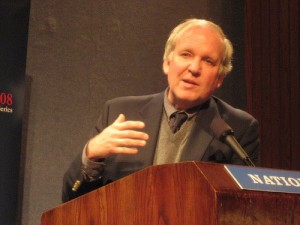 Former Clinton White House spokesman Mike McCurry (at right) offers up his remedy for what ails the newspaper business — collaboration. In a by-lined piece for the RealClearPolitics site, he rightly observes that newspapers, newsweeklies and their ilk simply cannot compete with all-news cable channels and the Internet.
Former Clinton White House spokesman Mike McCurry (at right) offers up his remedy for what ails the newspaper business — collaboration. In a by-lined piece for the RealClearPolitics site, he rightly observes that newspapers, newsweeklies and their ilk simply cannot compete with all-news cable channels and the Internet.
He also came to his collaborative conclusion culling the insights of Microsoft’s Chief Counsel for Intellectual Property Strategy Thomas C. Rubin:
“It would be one thing if print editions were being replaced with vibrant and profitable online versions. But as we all know, that is just not happening. Today we are still searching for healthy symbiosis between newspapers and new technology.”
Personally, I believe that some newspapers have succeeded in achieving that “healthy symbiosis with new technology.” But most, admittedly, have not. Two weeks ago, NYTimes.com debuted Times Extra, which aggregates non-Times content on its vaunted home page, and today, it launched Times Widgets, “a new online platform that gives users the ability to create customized widgets using The Times’s more than 10,000 RSS feeds” according to the news release. Cool, forward-thinking stuff and definitely symbiotic.*
McCurry recites Rubin’s “Three C’s” for achieving this newspaper nirvana: copyright, competition, and collaboration. It is the third “C” that allowed the music industry (record labels and iTunes) and the book (and now magazine) industry (publishers and Google) to overcome the issues inherent in the first two. He asks:
How might this work in the news world? Perhaps Google News and media outlets could collaborate to provide high quality content in exchange for a share of revenue and control of when and how their content is displayed in a search. Or perhaps news organizations could collaborate similarly with news aggregators, such as Google Reader or Bloglines (a division of Ask.com).
Once the three C’s are on place, a fourth “C” can manifest:
“Content” — quality content, to be precise. When copyright owners’ control is preserved, competition is sufficient, and collaborative solutions are the goal, the quality of available content will be dramatically improved.”
Talking about quality content, NPR sat down with The Times’s Bill Keller to gauge his outlook on his newspaper’s prospects:
“Good journalism does not come cheap. And, therefore, you’re not going to find a lot of blogs or nonprofit Web sites that are going to build a Baghdad bureau.” He also noted that “there’s a real shortage of the kind of information that I would call quality journalism.”
Regarding the Obama campaign’s direct-to-constituency communications:
Keller noted how the Obama campaign excelled at using online social-networking tools for fund-raising and building support. But, he said, “again, that’s something that works to mobilize your base. You need more than your base to govern. And even your most devoted admirers don’t want to rely just on you for word of what the government’s up to, and what it means.”
If you have six minutes, definitely take a listen.
* Full disclosure: this PR pro does some work for NYTimes.com.